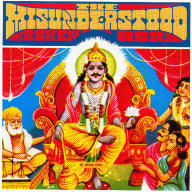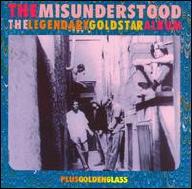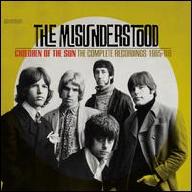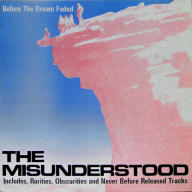The Misunderstood were formed in Riverside, California, an "Inland Empire" community roughly 60 miles east of Los Angeles. The group had their roots in the Blue Notes, an instrumental combo featuring George Phelps and Greg Treadway on guitars and Rick Moe on drums. Despite living in a landlocked town, Phelps and his friends developed a passion for surfing, frequently road-tripping to Encinitas to ride the waves, and a shared love of the beach brought Phelps together with Rick Brown, whose family had recently moved to Riverside. After the demise of the Blue Notes, Phelps, Treadway, and Moe decided to form a new band, and brought Brown on board as their lead singer. Billing themselves as Treadway & Company, they invited Steve Whiting to play bass, and began putting together a repertoire steeped in blues and covers of the tougher British Invasion groups, in particular the Rolling Stones, the Kinks, Them, and the Yardbirds. They also began writing songs of their own, and by mid-1965, they had enough material to cut a demo at a local recording studio. By this time, they had dropped the name Treadway & Company and branded themselves the Misunderstoods, a reference to the Animals' hit "Don't Let Me Be Misunderstood." After a few months of rehearsing, playing teen clubs, and appearing at school dances, another recording session took place in December 1965; the band's name had been revised to the singular Misunderstood.
After recording more material in January 1966, George Phelps dropped out of the band, preferring to get a day job, and after seeing Glenn Ross Campbell playing steel guitar with his group the Answers, the members of the Misunderstood were certain his unique style was the right fit for them. Campbell, who had been playing in country and rock bands for years, agreed, and his use of a fuzzbox to add a beefier tone to his refashioned blues licks gave the Misunderstood a sound unlike any other group on the inland scene. Not long after Campbell joined the act, they played a show at a shopping center in Riverside, and they were spotted by John Ravenscroft, a British disc jockey who had recently landed a job at a local FM radio station. Ravenscroft was blown away by what he heard, and he took the group under his wing, offering them advice and filling their ears with different musical influences. It would not be the last time the DJ helped a band get a break; years later, he would adopt the air name John Peel, and became one of the most influential radio personalities in the U.K.
In March 1966, Peel arranged for the Misunderstood to record a session at Hollywood's Gold Star Studio, famed as Phil Spector's favorite recording facility. The tapes showed a band who were moving beyond blues-rock into a more expressive and experimental sound that would anticipate psychedelic rock. Peel and the musicians became increasingly convinced that if they wanted to find the right audience for their work, they would be better off in England than California, and after pressing a single of two of the Gold Star tracks as a calling card ("You Don't Have to Go" b/w "Who's Been Talking"), they began blocking out plans to relocate to the U.K., with Peel's brother acting as their representative in England. They staged a final show in Riverside, and left for the U.K. in June 1966; to their chagrin, they discovered Peel hadn't contacted his mother, who was supposed to let the band stay at her home when they arrived in London, and his brother had done little to lay groundwork for their mission to conquer Great Britain. They also lacked work permits, but they were still able to land gigs and began finding an audience for their bold sound, especially after they acquired a manager, Nigel Thomas. However, in August 1966, homesick Greg Treadway quit the group and returned to California. The Misunderstood rebounded with the addition of new guitarist Tony Hill, who proved to be an excellent foil for Campbell's steel work and also wrote new material in tandem with Brown. A new demo was cut at London's I.B.C. studios, which Thomas took to Fontana Records; Fontana signed the Misunderstood, and in December 1966, they issued a single, "I Can Take You to the Sun" b/w "Who Do You Love."
The group bowled over the press in a media event staged by Fontana and they were being talked up by the British music weeklies, but a dark cloud appeared on the horizon. Rick Brown had been called up for the military draft, and after ignoring numerous letters from America's Selective Service System, he was informed he would be officially indicted on charges on draft evasion if he didn't return home to meet the draft board, so he flew back to California. Brown expected his commitments to Fontana in England as well as a letter from his doctor saying he was unfit for service would permit him to return to London relatively soon. However, his pleas were rejected, and he was given the option of serving two years in the Army or five years in prison. Brown chose the Army, and though the Misunderstood found a new singer, Steve Colyer, their management had lost confidence in the band after Brown left. They were booked to play shows in France in early 1967, only to discover that Campbell's, Moe's, and Whiting's visas would not permit them to return to the U.K. They had no choice but to go back to California, which spelled the end of the Misunderstood.
After returning to America, Glenn Ross Campbell was befriended by blues artist Rod Piazza, and he joined Piazza's group the Dirty Blues Band, appearing on their self-titled debut album, issued in 1967 by Bluesway Records. Meanwhile, John Peel continued to champion the Misunderstood even after their breakup, and at his urging, Fontana released another single from their recordings of the band, "Children of the Sun" b/w "I Unseen." The single generated enough attention that Campbell returned to England and assembled a new edition of the Misunderstood; the band would soon evolve into Juicy Lucy, who signed with Vertigo Records and put out their first album in 1969.
In the late '70s, some of the Misunderstood's single sides for Fontana began popping up on collections of rare garage/psychedelic gems, and Mike Stax, editor of Ugly Things magazine, began researching the group's history, which led to a series of articles in his magazine, a book titled Like, Misunderstood (which charted the band's rise and fall as well as Rick Brown's story after he fled the Army and became a fugitive), and an unproduced screenplay. In 1982, the British label Cherry Red Records released Before the Dream Faded, which brought together 13 recordings, combining their Fontana material with demos from the band's archives. Several other collections would appear before Cherry Red issued the definitive anthology in 2021, Children of the Sun: The Complete Recordings 1965-1966, compiled by Mike Stax, who also penned the liner notes. ~ Mark Deming, Rovi















